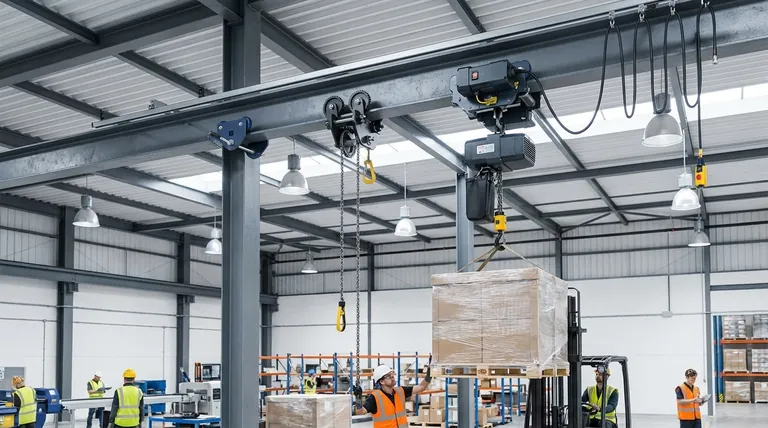When selecting an electric hoist, you have three primary types of trolleys to choose from for horizontal movement. These are the manual push/pull trolley, the hand-geared trolley, and the motorized electric travel trolley. Each type serves a distinct purpose, moving the hoist along a beam to position loads precisely where they are needed.
The choice of a hoist trolley is not just about moving a load from point A to point B. It's a critical decision that dictates the speed, precision, and physical effort required for your material handling operations. The key is to match the trolley's control method to your specific workflow.

Understanding the Role of the Trolley
A hoist provides vertical lift, but the trolley is what gives it horizontal mobility. It is the wheeled mechanism that allows the entire hoist assembly to travel along the length of a structural beam, such as an I-beam or H-beam.
Why It's a Critical Component
Without a trolley, an electric hoist is fixed in one spot. By integrating the hoist with a trolley, you transform it into a core component of a larger lifting system, such as an overhead crane or a jib crane.
This integration allows a single hoist to service a large work area, making it an essential tool in manufacturing facilities, warehouses, and assembly lines.
A Breakdown of Trolley Types
Each trolley type offers a different level of control and is suited for different applications, loads, and frequencies of use.
The Push/Pull Trolley (Manual)
This is the simplest and most economical option. The operator moves the trolley along the beam simply by pushing or pulling on the load itself.
It is best suited for lighter loads, short travel distances, and applications where the hoist is used infrequently. This type requires the most physical effort from the operator.
The Geared Trolley (Hand-Chained)
A geared trolley adds a layer of mechanical advantage. It is operated by pulling a hand chain, which turns a series of gears that propel the trolley wheels along the beam.
This method provides more precise and controlled movement than a push trolley, making it ideal for accurately positioning heavier loads without the higher cost of a motorized system.
The Electric Travel Trolley (Motorized)
This is the most advanced and ergonomic option. An integrated electric motor powers the trolley's movement, which is controlled by the same pendant or remote used for the hoist's lifting functions.
Electric trolleys are the standard for heavy loads, long travel distances, and high-frequency lifting cycles. They often feature dual-speed configurations for both rapid travel and precise final positioning, offering the highest level of control and ease of use.
Understanding the Trade-offs
Selecting the right trolley involves balancing cost, performance, and operational safety.
Cost vs. Performance
The initial cost increases with the level of control. Push trolleys are the least expensive, followed by geared trolleys, with electric trolleys being the most significant investment. However, the higher upfront cost of an electric trolley is often justified by major gains in productivity and efficiency.
Operator Effort and Safety
Manual push/pull trolleys require significant physical exertion, which can lead to operator fatigue and increase the risk of injury. Electric trolleys dramatically reduce physical strain and can improve safety by allowing the operator to stand farther away from the suspended load during movement.
Precision and Speed
Electric trolleys offer the best combination of speed and precision, essential for fast-paced assembly lines or delicate operations. Geared trolleys provide excellent precision for manual tasks, while push trolleys are the least precise and can be difficult to position accurately.
How to Select the Right Trolley for Your Application
Your choice should be driven by the specific demands of your work environment.
- If your primary focus is infrequent use with light loads: A push/pull trolley is the most cost-effective and practical solution.
- If your primary focus is precise manual positioning of medium-to-heavy loads: A geared trolley offers the best balance of control and affordability.
- If your primary focus is high frequency, heavy lifting, or maximum safety and efficiency: An electric travel trolley is the definitive choice for demanding applications.
Ultimately, matching your trolley type to your workflow ensures a safer, more productive, and cost-effective lifting system.
Summary Table:
| Trolley Type | Control Method | Best For | Key Characteristics |
|---|---|---|---|
| Push/Pull Trolley | Manual (Push/Pull Load) | Light loads, infrequent use, short distances | Most economical, requires significant operator effort |
| Geared Trolley | Manual (Hand Chain) | Precise positioning of medium-heavy loads | Good control & mechanical advantage, moderate cost |
| Electric Travel Trolley | Motorized (Pendant/Remote) | Heavy loads, high frequency, long distances | Maximum efficiency & safety, reduces operator fatigue |
Ready to optimize your material handling with the right hoist and trolley system?
GARLWAY specializes in construction machinery, offering robust electric hoists and the ideal trolley system for construction companies and contractors globally. We can help you select the perfect combination for maximum safety, precision, and productivity in your operations.
Contact GARLWAY today for a consultation and let our experts help you build a more efficient lifting solution!
Visual Guide

Related Products
- Ready Mixer Machine for Construction Ready Mix Machinery
- Commercial Construction Mixer Machine for Soil Cement Mixing Concrete
People Also Ask
- What safety considerations are important for concrete mixer operation? A Guide to Proactive Risk Management
- Why is the manufacturer's strength and service important when choosing a concrete mixer? Ensure Long-Term Project Success
- Can a concrete mixer be used for mortar? Understanding the trade-offs for your project
- When was the first concrete mixer developed and by whom? Discover the 1900 Breakthrough
- What was significant about Roscoe Lee's 1934 concrete mixer design? Pioneering Modular Construction Equipment

